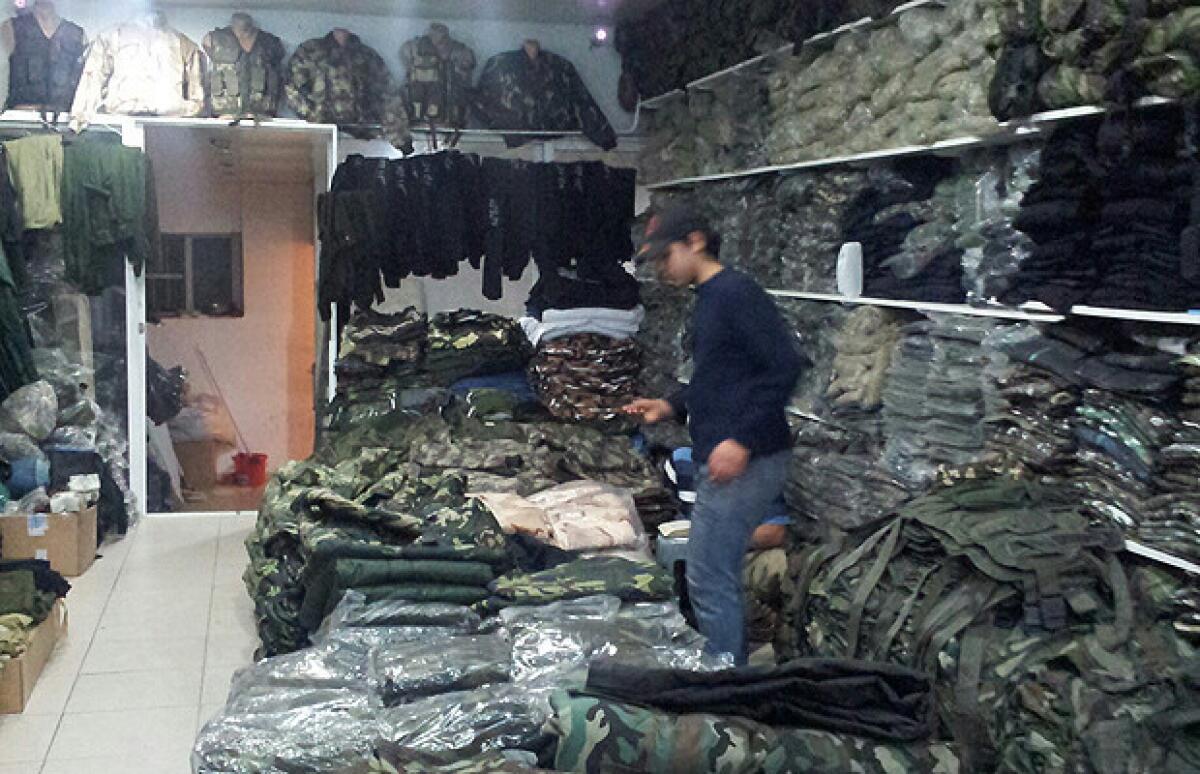Turkish market on Syrian border serves the discerning rebel

- Share via
ANTAKYA, Turkey — Two scruffy men with beards lean over assorted piles of military-style trousers, jackets and vests, all in different camouflage patterns. The pair examine a thick winter jacket, stroking the material as a salesman offers a discount for bulk orders.
“We might take 40 pieces,” one of the men murmurs in Arabic, as the two turn their attention to other wares.
Near the Old Station district of this southern Turkish city lies the Aleppo Market, an animated jumble of pomegranate juice stalls, kebab stands and shops offering goods such as furniture and spices. Interspersed amid the vigorous mix are about half a dozen purveyors of military gear, who cater to a very particular clientele: fighters headed for the rebel ranks over the Syrian border, 10 miles away.
“Sure, we’re arming the brigades and battalions of Syria,” boasts one shop employee, Marwan, a 27-year-old from Damascus, gesturing broadly at the establishment, its shelves stocked with fatigues and other daily needs of the well-equipped soldier, from daggers to day packs to deodorant.
“I get a new commander in here every day,” continues Marwan, who, like others interviewed, asked to be identified by only his first name for security reasons.
“We even have some items prepackaged in 500 units,” he adds, tapping a tight bundle of fatigues wrapped in black plastic. “Take two, and there you go: 1,000 pieces.”
With large swaths of northern Syria largely in the hands of the armed opposition, the border region of southern Turkey has become a supply depot for many paramilitary groups, a vast PX for insurgent warriors fighting to oust the government of Syrian President Bashar Assad. Antakya, near the site of the fabled ancient Silk Road city of Antioch, has emerged as a throbbing hub of the thriving rebel trade.
Flush with petrodollars from Persian Gulf donors, commanders and individual fighters seek out wares such as brass knuckles, gas masks, cartridge belts and multi-pocketed pants and vests. Military weapons and ammunition are not for sale, at least not openly, because of Turkish government strictures. The shops’ exteriors typically feature hanging displays of fatigues and backpacks, attracting buyers who seem to have money to burn.
“Qatar supports, Saudi Arabia supports, some rich guy wants to do jihad with cash supports,” explains Marwan, his gaze resting on a wall featuring an array of black bandannas and baseball-style caps. “And they come from all over, Libyans, Moroccans, Jordanians. They all want to do jihad in the name of God.”
Rather than sports logos, the brimmed caps feature the slogan, “There is no god but God,” stitched in stylized white Arabic letters against a black backdrop. The emblem mimics the black banner of Islamic militants who have assumed a major role in the Syrian civil war.
The shopkeepers have learned to cater to discerning consumers. The owners are Turkish, but clerks address customers in classical Arabic; recruits from the gulf, North Africa and elsewhere are unlikely to speak Turkish and may not yet be familiar with colloquial Syrian speech. Demands vary depending on a shopper’s home country or personal whims.
“Yeah, sure, they all want to do jihad in the name of God,” says another shop clerk, Mohammad, 24, allowing a theatrical wink as he leans against a shelf of black backpacks. “The other day some guy comes in and says, ‘Can you give me fatigues in the Lebanese cut?’ I told him, ‘What do you think this is? You want to go fight fashionably?’”
Along with the section specializing in combat clothing, the shop where Mohammad works features a neon-lighted room brimming with rifle scopes, binoculars and a fearsome array of knives and swords, among other martial accouterments. Some items are imported from China; others are made in Turkey.
“As seen on TV!” blares the lettering on stacked boxes of specialized, rechargeable flashlights. Much of the merchandise is dual-purpose: It serves for both hunting and jihad, providing some measure of cover for both buyer and seller, skirting Turkish legal restrictions on the sale of military items.
“But the FSA uses all of it,” explains Ahmad, a third employee of the shop, referring to the U.S.-backed Free Syrian Army.
Not everything on the overflowing shelves is quite what it appears.
Grasping what looks like a standard flashlight, Marwan presses a button, unleashing a small fireworks-like display: Bright blue sparks spring from the bulb area, and a loud, crackling sound fills the shop. A version of a stealthy Taser is fashioned to look like a Nokia cellphone. Alas, the gimmicky items aren’t especially big sellers.
“They don’t really need them in there,” Marwan explains. “After all, they have bullets.”
Bulos is a special correspondent. Times staff writer Patrick J. McDonnell contributed to this report.
More to Read
Sign up for Essential California
The most important California stories and recommendations in your inbox every morning.
You may occasionally receive promotional content from the Los Angeles Times.










